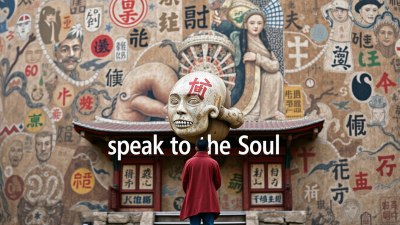When New Languages Speak to the Soul
Explore the profound connection between language and the human soul, and how new languages can transform lives.

Image created with Flux Schnell
Language is more than just a means of communication; it is a reflection of culture, identity, and the intricate interplay of thoughts and feelings. When people engage with new languages, they often find that their perception of the world shifts, revealing deeper aspects of their own identity and the human experience. This phenomenon raises the question: how do new languages speak to the soul? To answer this, we must delve into the roles of language in shaping our thoughts, the emotional connections we forge through new linguistic frameworks, and the transformative power these languages can hold.
Language serves as the foundation of our interactions and expressions. It encapsulates our history, values, and traditions, giving us the means to articulate our innermost thoughts and emotions. Every language carries unique features that influence the way we think about the world. For instance, languages like Japanese encapsulate cultural nuances in expressions that often don’t exist in English, providing insights into the importance of hierarchy and relationships in Japanese society. Thus, learning a new language can open up a rich tapestry of cultural understanding and emotional depth.
When we learn a new language, we engage with a new way of seeing the world. This experience is not merely academic; it is a profound journey into understanding different perspectives that can resonate deeply with our own soul. As we master new vocabulary and grammar, we also discover the idiomatic phrases that encapsulate emotions and concepts in ways our native language might not. For instance, the Portuguese word 'saudade' conveys a deep sense of longing and nostalgia, a feeling that many have experienced, yet might not have a single-word label in their native tongue. This linguistic exploration often invites us to reflect on our own experiences and emotional landscapes.
The emotional connections we form through learning new languages play a crucial role in how they resonate with our souls. As language learners, we aren’t just memorizing vocabulary or syntax; we are immersing ourselves in the histories and narratives that have shaped the speakers of that language. Literature, music, and film in a new language allow us to traverse cultures and time. Consider the impact of literature—Gabriel Garcia Marquez's works in Spanish or Haruki Murakami’s narratives in Japanese evoke universal themes that resonate profoundly, yet the emotional experience can differ greatly depending on the language through which they are accessed.
This connection to new languages is often related to the process of identity formation. The journey of adopting a new language can empower individuals to express elements of themselves that may have been suppressed or muted in their primary language. For bilinguals or multilinguals, switching between languages often alters their persona, allowing them to embody different facets of identity. Research suggests that language can influence personality traits; for example, some may feel more confident speaking English but more empathetic when communicating in their native language. This duality offers a window into the complexities of human nature, where language acts as a conduit between self-exploration and expression.
The transformative power of language extends beyond individual experiences; it has the ability to bridge divides among communities. In our increasingly globalized world, where cultural boundaries are frequently challenged and redefined, learning a new language can promote understanding and empathy. By communicating across linguistic divides, individuals foster relationships that honor diversity. For instance, initiatives that emphasize language learning among immigrants enable deeper integration into society, allowing for richer shared experiences and mutual respect. As new languages speak to the soul, they create pathways for connection and build bridges that unite rather than segregate.
Furthermore, the linguistic relativity hypothesis asserts that the structure of a language affects its speakers' worldview. This hypothesis suggests that our thought processes could be shaped by the languages we use, making the learning experience richer than merely acquiring new words. As we explore different languages, we might find ourselves not just translating literal meanings but rather experiencing alternate conceptual frameworks that challenge our existing beliefs. The way we perceive time, relationships, and emotions can significantly change depending on the linguistic tools at our disposal.
Moreover, recent studies in neuroplasticity hint at the cognitive benefits of learning new languages. Engaging in language learning stimulates the brain, promoting a better understanding of one's language and thought patterns. Neuroscientific research shows that bilingualism can delay cognitive decline, enhance multitasking skills, and foster an improved capacity for empathy. These cognitive enhancements further solidify the connection between language and our emotional well-being, suggesting that languages serve as a bridge not just to new cultures, but to healthier, enhanced states of being.
The emotionality linked to language learning can sometimes lead to difficulties, particularly when grappling with new phonetic sounds or idioms. Language learners may experience frustration or doubt, yet overcoming these hurdles often leads to profound personal growth. The process teaches perseverance and adaptability, virtues that contribute positively to one's life beyond language acquisition. As learners navigate these challenges, they may come to appreciate the intrinsic value of vulnerability—exposing oneself to new experiences and admitting that one does not yet know everything. This softening of the ego allows for a more compassionate relationship with oneself and others, reinforcing the idea that learning a new language can indeed speak to the soul.
In conclusion, the journey of learning a new language offers a rich tapestry of experiences that resonate deeply within our souls. It enriches our understanding of the world, fosters emotional connections, and promotes personal transformation. Ultimately, the intersection of language and the human experience reveals profound truths about identity, empathy, and cultural understanding. As we embrace new languages, we allow ourselves to speak, not just with words, but through the very essence of our shared humanity.











